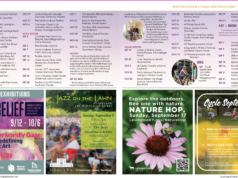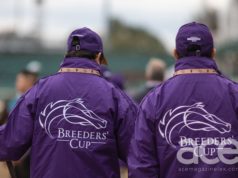Love, Death, and Basketball
‘They never give a hillbilly a break’
by Nick Stump
[The following essay was written for Ace in 2014 by the late great musician Nick Stump, who died in February 2021. Reprinted in honor of Stump’s recent October birthday, and Big Blue Madness.]



My Uncle Clayton Adams was a great man. While most of the men in my family had gone off to fight in World War Two, Clayton stayed home in Lee County, cared for the rest of the family, followed every scrap of news from the front and waited for his brothers and friends to return. The brothers came home from the war, worked for and played baseball for Wiseman Oil’s semipro team and in the winter we all listened to and talked about Kentucky basketball. Clayton didn’t fight wars and he didn’t play sports but everyone who knew always deferred to his vast knowledge and expertise.
It was one thing to put on a uniform, but it was altogether a different thing to understand and articulate what it meant. Clayton could explain the strategy involved in the Battle of Stalingrad, could explain the precise mechanics of throwing a curve ball and, of course, he knew Kentucky basketball better than anyone.
His manner of speaking was not like other people from around home. He had lived in the Lee County hills 30 or 40 years longer than I, but his accent was not the soft patois of home. Clayton’s voice was sharp around the edges, part Cincinnati Reds radio announcer, part big-city evangelist —all laid in with a little Burt Lancaster. Clayton liked Burt Lancaster. He was also the family lay preacher, in charge of all required family praying, officiating over feasts, winking at the kids and in my case, instructing a curious nephew in matters of God, love, death, and basketball.
War is us or them. We are from Kentucky, the basketball epicenter of the world. Kentuckians made the best soldiers, the best workers, the best-looking women and by gosh, he would say, had the best darned basketball team on the planet.
Clayton didn’t go to war and he didn’t play sports but he understood both. Knowledge was his strong suit. He studied the science of basketball and was the man who first explained to me the particulars of the offensive weave and how though the zone defense was unmanly, he supposed it was a legitimate strategy for weak teams. Kentuckians, as a group, he taught, are superior to all other groups no matter where you go.
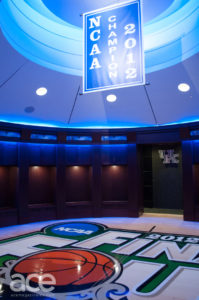

Clayton would not have been surprised. Basketball was war. War is us or them. We are from Kentucky, the basketball epicenter of the world. Kentuckians made the best soldiers, the best workers, the best looking women and by gosh, he would say, had the best darned basketball team on the planet. Of course, everyone hates us. We are better than they are. They will always hate us for it and you might as well get used to it. He also said the words, “Remember, they never give a hillbilly a break.”
It’s difficult to grow up around a Clayton and not carry a little of him around in your heart. To this day, I still carry a tiny chip on my shoulder about being from Kentucky. Years ago, I walked out on a stage in New York City and said to a full house, “How you all doing?” People in the audience twittered on hearing my accent. After the show, a woman in a very small black dress asked me if I had worn shoes when I was growing up.


The next day I had a meeting at the Warner Brothers lunchroom. I was there to audition for a job writing a screenplay about the 1966 Kentucky Texas Western game. I had been in LA for two weeks writing the first act of the script. Those pages and the hard work of my friend, director Richard Pearce had landed me in a fancy dining room, for a fancy lunch, with a bunch of real fancy people. It was also my first movie pitch session. I was a little intimidated.
The film’s producer (he was famous enough that I had seen some of his movies), looked at me and said, “So Nick, why don’t you tell us your story.” I had hoped we might have a bit of small talk first and at least thought I would get to eat my steak before they threw me out. Put on the spot, I swallowed that first bite and then realized, for all my preparation, I now had no idea what to say. A development guy sitting across from me stepped up and saved my day.
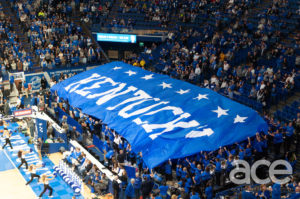

At that moment, I heard the screaming voices of all my ancestors – my father, my grandfather, my uncles and especially Clayton. Every voice said, “They never give a hillbilly a break.” These LA types were trying to get me to work for no money! I looked back at him and said, “Why don’t you all cut me a check, so I can get back to Kentucky and get to work on this thing?” There are a few clear, crystalline moments in one’s life and one way or the other this was mine. The clatter of silverware on crystal stopped dead and everyone looked at the two of us. Mr. Villanova paused, “Okay…Let’s do this thing.” He grinned, “Kentucky still loses, right?” Everyone laughed and I nodded. One of Villanova’s toadies said, “We should put Nick on the Civil War project Jack’s working on. He’ll have the South winning this time.” I didn’t bother trying to explain most of my family along with a sizable portion of Kentucky had sided with the North. On the way out, Richard and I walked past a water tower painted with a giant Bugs Bunny, he said, “That was perfect. Nobody ever talks to him like that.”
So, on that day, in a fancy big studio dining room, one hillbilly from the Great Commonwealth of Kentucky got a break. The next morning, I flew home to Kentucky with a fresh cut Warner Brothers check in my pocket. Clayton would have been proud.
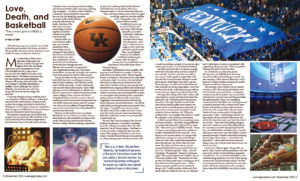

I never saw Clayton again. Along with my pretty wife, Clayton and his generation now live only in the stories we tell and those memories we hold close. You can’t have basketball or love without losing sometime. So, I like it that spring comes at the end of basketball season. We take our victories and losses with hope for next year. And I will always cherish those few precious times when this old hillbilly was given a break.
This article also appears on page 8 and 9 of the November 2021 print edition of Ace.
Subscribe to the Ace e-dition for Lexington news, arts, culture, food, and entertainment news delivered to your inbox.
Call today to advertise in Ace, 859.225.4889



